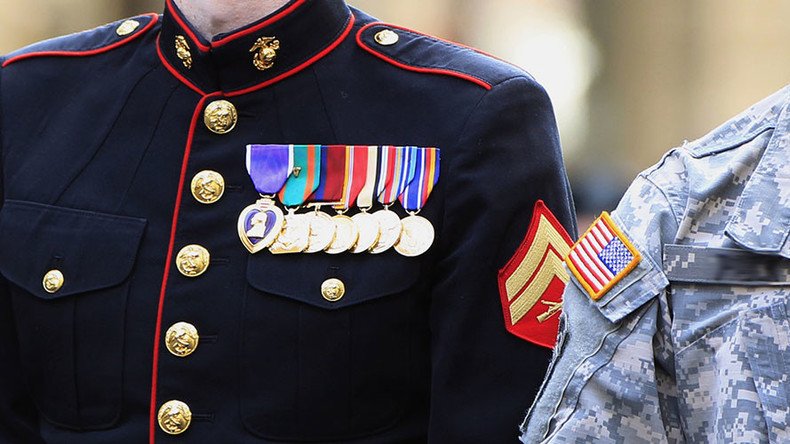Over 125,000 veterans denied benefits by the VA – report

Tens of thousands of Iraq and Afghanistan veterans with less-than-honorable discharges, many with physical and mental injuries, were being denied care by the Department of Veterans Affairs, claims a new report by a veterans’ advocacy group.
“The VA created much broader exclusion criteria than Congress provided, failing to give veterans due credit for their service to our country,” said the report by advocacy group Swords to Plowshares, published on Wednesday.
Under the 1944 GI Bill, Congress expanded eligibility for veteran benefits to almost all veterans, even those with less-than-honorable discharges, provided the misconduct was not so severe that it should have led to a trial by court-martial and a dishonorable discharge. Congress left open the door to benefits for spectrum of discharges between honorable and dishonorable, including “undesirable” and “other than honorable.”
Congress has failed our veterans over and over again. They should be ashamed of themselves for this. #lasenhttps://t.co/SvLnteQ0cC
— Col. Rob Maness ret. (@RobManess) March 30, 2016
The report found the VA labeled 90 percent of veterans with bad paper discharges as “dishonorable,” even though the military classified them differently.
“The VA’s board and vague regulations are contrary to law and create a system that does not work for the VA or for veterans… and stops the agency from effectively addressing the national priorities of ending veteran suicide and homelessness,” said the report.
Veterans with bad paper discharges were more likely to have mental health conditions and were twice as likely to commit suicide, the report found. They are also more likely to be homeless and involved with the criminal justice system.
“Yet, in most cases, the VA refuses to provide them any treatment or aid,” said the group.
The New York Times cited the example of Joshua Bunn, a US Marine Corps veteran who was deployed to Afghanistan in 2009. His unit served in “one of the bloodiest valleys in Afghanistan,” killing hundreds of enemy fighters and losing more Marines than any other battalion that year.
PAWS: Republican lawmakers’ bill would give #veterans puppies for PTSD https://t.co/m2xVNr3W6Mpic.twitter.com/ttbGQojXlh
— RT America (@RT_America) March 17, 2016
Haunted by nightmares and becoming suicidal after the deployment, Bunn was hospitalized when he got home from Afghanistan. Subjected to hazing by his unit, he was denied help and ran away from his base in California. The USMC charged him with misconduct and gave him a less-than honorable discharge. As a result, he was denied benefits by the VA.
For the first time, the Swords to Plowshares report compared 70 years of data from the Department of Defense and Veterans Affairs and found that over 125,000 veterans were unable to access basic benefits including healthcare, disability compensation and homeless assistance – even though the VA had never completed an evaluation of their service.
It also found the VA excluded from benefits 6.5 percent of veterans who served since 2001, compared to 2.8 percent who served in Vietnam and 1.7 percent who served in World War II.
Veterans Administration to outsource medical services for veterans’ care https://t.co/tODv6bfvXPpic.twitter.com/2cMtwXI3M3
— RT America (@RT_America) November 19, 2015
“It has gotten worse with every generation, and it appears to hit the veterans Congress intended to protect,” Bradford Adams, a lawyer and one of the report’s authors told The New York Times. “They knew these folks had been through combat, and wanted to make sure they had help. The VA doesn’t seem to be doing that.”
Further analysis showed that three out of four veterans with “bad paper” discharges who served in combat and who have post-traumatic stress disorder (PTSD) were denied eligibility by the Board of Veterans’ Appeals. Marine Corps veterans were nearly 10 times more likely to be ineligible for benefits than Air Force veterans.
‘When you kill your first person, everything becomes a fraud’ - US veterans on war (VIDEO) https://t.co/qVBMRNJJuTpic.twitter.com/461EeGVyga
— RT America (@RT_America) November 13, 2015
Sloan Gibson, deputy secretary of Veterans Affairs, said a statement he welcomed the report’s findings.
“Where we can better advocate for and serve veterans within the law and regulation, we will look to do so as much as possible,” he told the New York Times.
The report’s recommendations to the VA were to revise its regulations to reflect Congressional intent, and only exclude those former service members who were discharged dishonorably. Furthermore, the VA should only require pre-eligibility reviews for those veterans who received punitive discharges, and make sure all its staff and volunteers understand Congressional intent, the authors said.
“Adoption of those recommendations would help to ensure that no veterans are denied the care and support that our nation owes them – and that Congress intended to provide them,” said the report.












